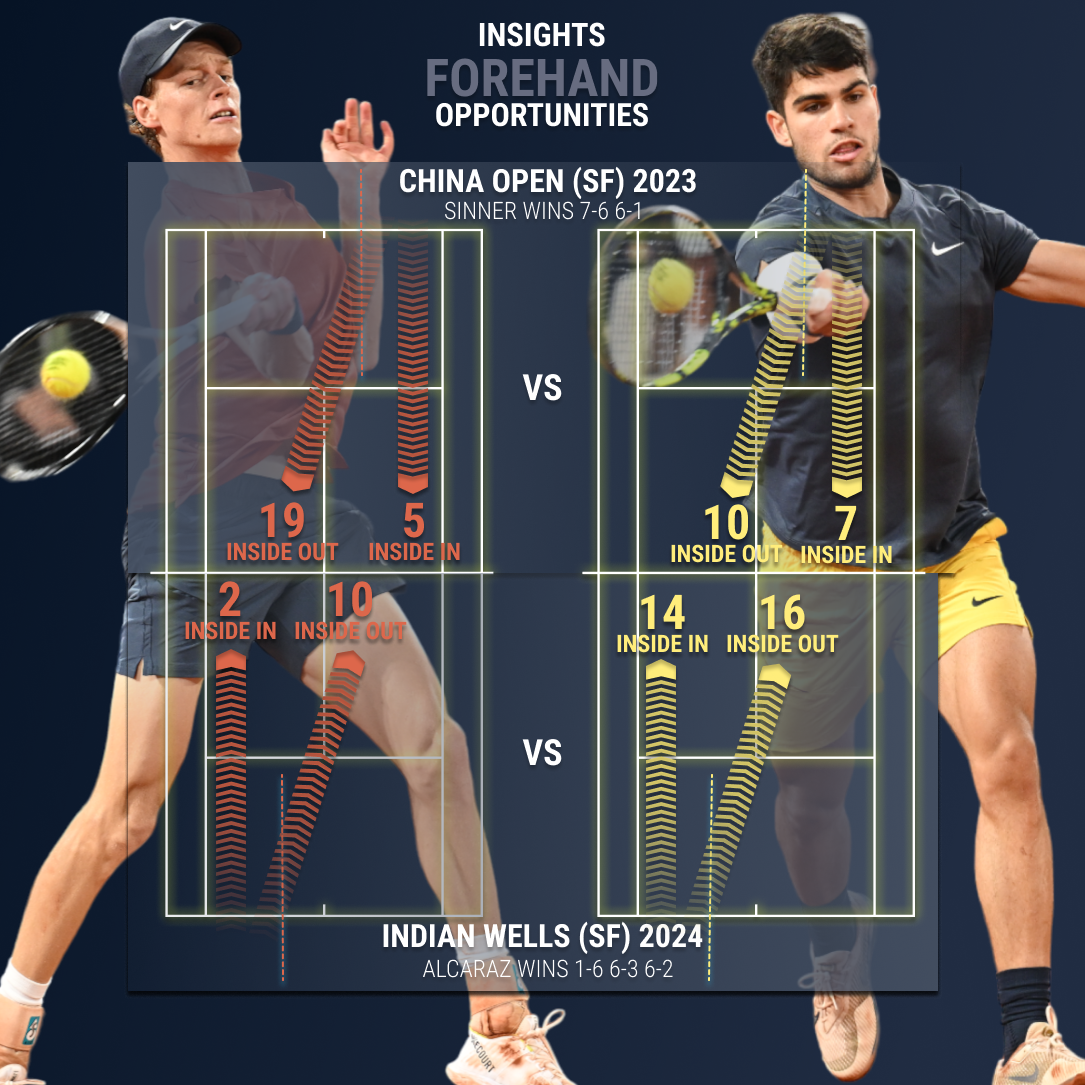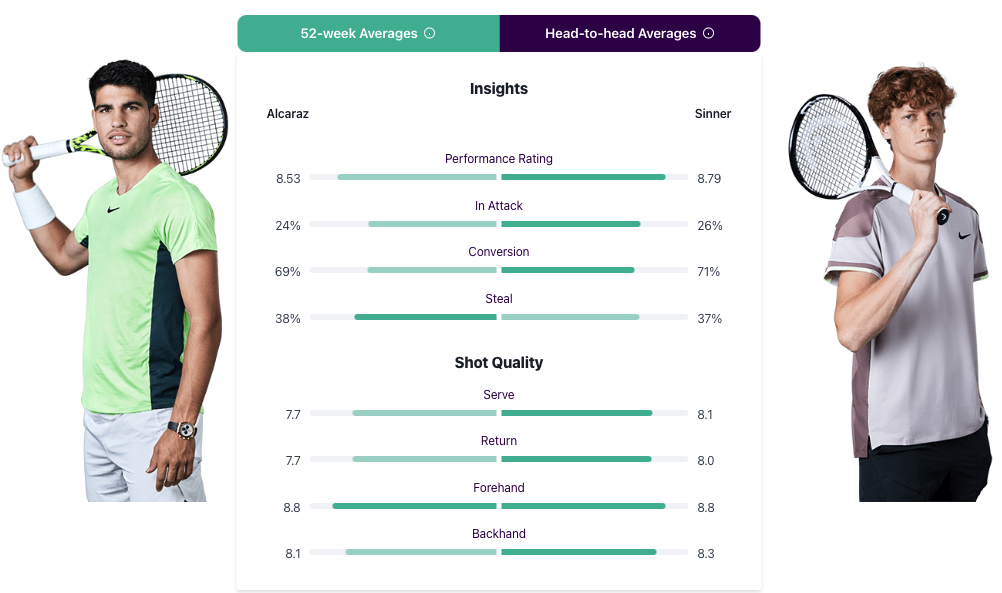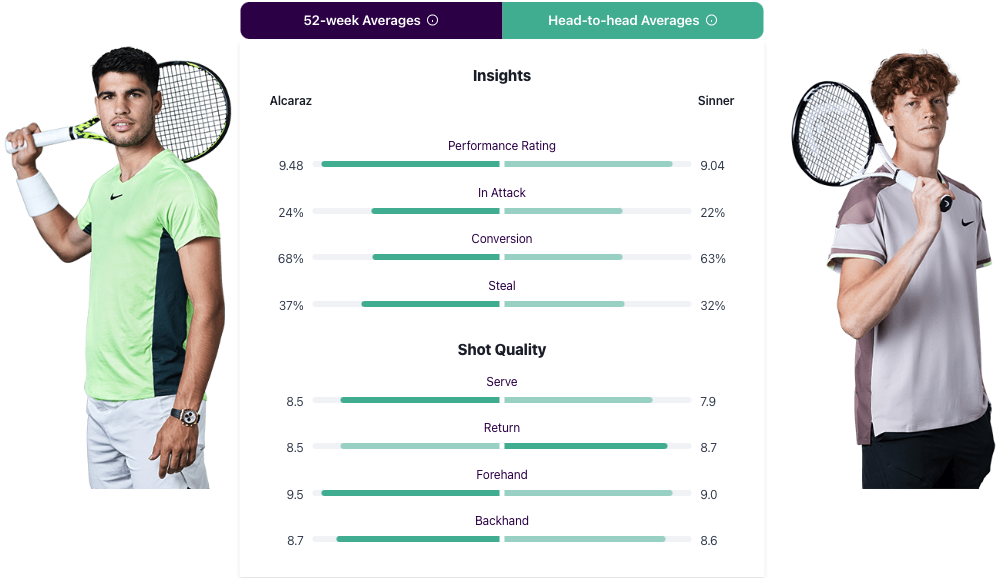Sinner v Alcaraz: The key battle – who gets on their forehand first
Ahead of their Roland-Garros semifinal, the stats show how the two men raise their games when they play each other
 Carlos Alcaraz et Jannik Sinner – © Gepa / Panoramic I © Antoine Couvercelle / Panoramic
Carlos Alcaraz et Jannik Sinner – © Gepa / Panoramic I © Antoine Couvercelle / Panoramic
Jannik Sinner and Carlos Alcaraz will lock horns for the ninth time on Friday when they play each other in the semi-finals at Roland-Garros, their third meeting in a Grand Slam.
The pair have already produced some incredible battles, none more so than their US Open quarter-final meeting in 2022, when Sinner had a match point only for Alcaraz to save it and go on to win the title.
The pair seem to bring the best out of each other, forcing each other to extremes and producing incredible tennis when the pressure is at its highest. This is only their second meeting on clay – Sinner won the first, in Umag in 2022 – and of course, this is a battle between the current Wimbledon champion (Alcaraz) and the newly-crowned Australian Open champion – and new world No 1 – Sinner.
Forehand prowess leads to victory
We have become used to the cat and mouse exchanges between the two, each one doing their best to avoid the other’s forehand, until they have to, or until they can attack, and this one promises to be no different. TennisViz and Tennis Data Innovations have been going through the stats and have been looking at the inside-out forehand of both men, based on their two most recent battles, in the China Open last year and in Indian Wells earlier this year.
As the graphic below shows, the outcome of both those two matches was inextricably linked to how successful each player was in getting round their backhand, in the backhand corner, to hit the inside-out forehand. Whoever won the backhand to backhand battle, enabling them to attack with the forehand, came out on top.
In China, represented by the top half of the graphic, Sinner was able to create 19 inside-out forehand opportunities, compared to 10 for Alcaraz. In Indian Wells, it was the other way round, with Alcaraz creating 16 to the 10 of Sinner.

Sinner’s stats better over past 12 months
Not surprisingly, the pair are closely matched when you look at their stats on the ATP Tour when averaged over the past 52 weeks.
The numbers reflect Sinner’s rise in the past 12 months, his brilliant end to the year and then outstanding start to this year, including his win at the Australian Open, his first Grand Slam title.
Sinner has the edge in all the categories in the graphic below, the only exception being the “steal” category, when a player wins a point having earlier been on the defensive. It’s not much, 38 percent to 37 percent, but it’s indicative of the Spaniard’s ability to turn defence into attack in the blink of an eye.
The biggest differential is in the serve performance rating, which takes into account speed, accuracy and spin, where Sinner is at 8.79 to the 8.53 of Alcaraz. The Italian has changed his serve style in the past year, slightly, and added more pace, which is paying dividends.
The pair are equally matched on the forehand over the past 52 weeks, at 8.8, but with Alcaraz coming into Paris with a forearm injury, it remains to be seen if he will be able to cut loose as he does when he’s 100 percent healthy.

Alcaraz and Sinner take each other to new heights
Like so many great rivals in the past, Alcaraz and Sinner seem to bring out the best in each other. That US Open meeting produced what many called “video game tennis”, such was the speed and quality of the exchanges.
When playing each other, Alcaraz seems to elevate his game even further, inspired, perhaps, by Sinner’s brilliance and knowing that he can’t afford to play anything other than his absolute best.
The Wimbledon champion heads the stats in all categories in the graphic below, other than return, where Sinner retains the edge. How Sinner copes with an Alcaraz firing on all cyclinders could decide the match.

ROLAND-GARROS STATS GIVE BOTH MEN HOPE
At Roland-Garros this year, the pair have been pretty closely matched. Alcaraz has the edge on return points won against the second serve (42% to 36%) but Sinner wins more on the second serve (59% to 57%).
Virtually even on break points won, and absolutely level on percentage of forehand winners, they differ in other categories. Sinner has been more successful on points won at the net with 81 of 104 (78%), to Alcaraz’s 70%, while the Spaniard has been more successful at the baseline (55% to 50%).
And perhaps the biggest differential has been in return games won. Alcaraz has taken 43 percent of his opponent’s service games, while Sinner stands at 34%.
In the end, stats won’t necessarily tell the story but it’s fascinating to see where the match could be won, and how the two men are likely to raise their games thanks to the ability and shot-making of the other.










